Clarissa Dalloway's Route
If route does not appear, zoom out to see red line and points.
_Early Morning to 11:00 AM
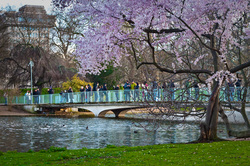
St. James Park
_1. Event: Clarissa and Hugh Whitbread meet
Location: Near the entrance of St. James Park (pg. 5)
Interaction: The meeting between Hugh Whitbread and Clarissa moves the narrative to thoughts about Clarissa's past and Hugh's role in it.
Analysis: Clarissa and Hugh have known each other for many years, and therefore, they share a common history. This particular interaction causes Clarissa to think about her past relationship with Peter Walsh, a man that she refused to marry, and how Peter and her husband Richard both dislike Hugh.
Location: Near the entrance of St. James Park (pg. 5)
Interaction: The meeting between Hugh Whitbread and Clarissa moves the narrative to thoughts about Clarissa's past and Hugh's role in it.
Analysis: Clarissa and Hugh have known each other for many years, and therefore, they share a common history. This particular interaction causes Clarissa to think about her past relationship with Peter Walsh, a man that she refused to marry, and how Peter and her husband Richard both dislike Hugh.
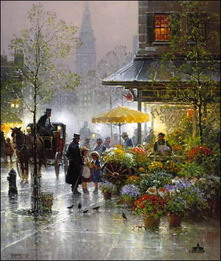
Flower Shop
_2. Event: Miss Pym approaches Clarissa in Mulberry’s, the flower shop
Location: Mulberry’s (pg. 12)
Interaction: Miss Pym assists Clarissa with her purchase.
Analysis: As Miss Pym approaches Clarrissa to greet her, Clarissa notes that Miss Pym's red hands look "as if they had been stood in cold water with the flowers" (Woolf 12). The mention of flowers leads her to note the variety of flowers and she begins to feel calmed. Noting how Miss Pym half closes and opens her eyes as she takes in the aroma, Clarissa again begins to detail the beauty of the flowers and feels content. Thus observations of Miss Pym lead to observations of the flowers, which then incite positive emotions in Clarissa.
Location: Mulberry’s (pg. 12)
Interaction: Miss Pym assists Clarissa with her purchase.
Analysis: As Miss Pym approaches Clarrissa to greet her, Clarissa notes that Miss Pym's red hands look "as if they had been stood in cold water with the flowers" (Woolf 12). The mention of flowers leads her to note the variety of flowers and she begins to feel calmed. Noting how Miss Pym half closes and opens her eyes as she takes in the aroma, Clarissa again begins to detail the beauty of the flowers and feels content. Thus observations of Miss Pym lead to observations of the flowers, which then incite positive emotions in Clarissa.
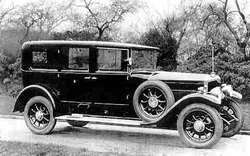
The Motor Car
3. Event: The Motor Car
Location: Mulberry’s shop window (pg. 14)
Interaction: The Motor car acts as a shift between the mind of Clarissa Dalloway and Septimus, who both witness the event and form different opinions about who and what the car is about.
Analysis: Clarissa wonders about the identity of the passenger in the motor car and believes the car may be the Queen's. The lustre of the footman's discs reminds her of the candelabras and stars on that night in Buckingham Palace. She thinks of Hugh Whitbread and the party she hosted.
Location: Mulberry’s shop window (pg. 14)
Interaction: The Motor car acts as a shift between the mind of Clarissa Dalloway and Septimus, who both witness the event and form different opinions about who and what the car is about.
Analysis: Clarissa wonders about the identity of the passenger in the motor car and believes the car may be the Queen's. The lustre of the footman's discs reminds her of the candelabras and stars on that night in Buckingham Palace. She thinks of Hugh Whitbread and the party she hosted.
11:00 AM to 11:30 AM
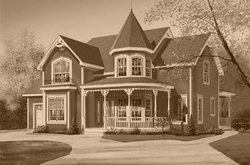
The Dalloway Home
4. Event: Peter visits Clarissa at her home
Location: The Dalloway Home (pg. 39)
Interaction: During Peter's visit, the narrative jumps between Clarissa and Peter's thoughts about each other, their past, and their present state.
Analysis: The surprise visit from Peter arouses doubts in both Peter and Clarissa and forces both of them to face their failures in life. Peter never reached the success that he and Clarissa once believed he would. Instead, he is unemployed, without children, and now without a wife. Clarissa settled for the safe route. She married Richard because he was safe and gave her the security and independence that she wanted. Their visit also causes them to consider the path their lives would have taken had Clarissa agreed to marry Peter. They begin to doubt whether they made the right choices in their youth, whether they made the right decisions during their defining moments.
Location: The Dalloway Home (pg. 39)
Interaction: During Peter's visit, the narrative jumps between Clarissa and Peter's thoughts about each other, their past, and their present state.
Analysis: The surprise visit from Peter arouses doubts in both Peter and Clarissa and forces both of them to face their failures in life. Peter never reached the success that he and Clarissa once believed he would. Instead, he is unemployed, without children, and now without a wife. Clarissa settled for the safe route. She married Richard because he was safe and gave her the security and independence that she wanted. Their visit also causes them to consider the path their lives would have taken had Clarissa agreed to marry Peter. They begin to doubt whether they made the right choices in their youth, whether they made the right decisions during their defining moments.
_1:30 PM to 3:00 PM

Roses from Richard Dalloway
_5. Event: Richard brings Clarissa flowers
Location: The Dalloway Home (pg. 113)
Interaction: The narrative shifts between the thoughts of Richard Dalloway and Clarissa.
Analysis: Richard is worried throughout the conversation that Clarissa does not understand Richard's love for her and that Clarissa still loves Peter. Richard thinks, “Happiness is this...” (116) as he talks to Clarissa and holds her hand. Richard mentions that Hugh was at lunch and Clarissa thinks that Hugh has become "an intolerable ass" (116). Her thoughts of Hugh cause her to think of Peter before he left for India. She believes she might have married Peter "just as he always was" (116). Clarissa's bickering on having to invite dull women to her parties leads Richard to wonder why she cares so much about these parties. As Clarissa receives her flowers, all of her concerns of the present day flood her mind, and her thoughts concentrate little on the present moment. These concerns include Peter and his love life, Miss Kilman, her preparations for the party, and having received no invitation for lunch from Lady Bruton. She repeatedly thinks about the beauty of her roses. Richard’s departure sparks a long train of thought in Clarissa. Her train of thought concerns her interest in flowers rather than Richard’s Committee about the Armenians and also concerns her sudden unhappiness are prominent in her mind.
Location: The Dalloway Home (pg. 113)
Interaction: The narrative shifts between the thoughts of Richard Dalloway and Clarissa.
Analysis: Richard is worried throughout the conversation that Clarissa does not understand Richard's love for her and that Clarissa still loves Peter. Richard thinks, “Happiness is this...” (116) as he talks to Clarissa and holds her hand. Richard mentions that Hugh was at lunch and Clarissa thinks that Hugh has become "an intolerable ass" (116). Her thoughts of Hugh cause her to think of Peter before he left for India. She believes she might have married Peter "just as he always was" (116). Clarissa's bickering on having to invite dull women to her parties leads Richard to wonder why she cares so much about these parties. As Clarissa receives her flowers, all of her concerns of the present day flood her mind, and her thoughts concentrate little on the present moment. These concerns include Peter and his love life, Miss Kilman, her preparations for the party, and having received no invitation for lunch from Lady Bruton. She repeatedly thinks about the beauty of her roses. Richard’s departure sparks a long train of thought in Clarissa. Her train of thought concerns her interest in flowers rather than Richard’s Committee about the Armenians and also concerns her sudden unhappiness are prominent in her mind.
Early Night to 3:00 AM
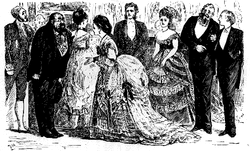
Mrs. Dalloway's Party
6. Event: Mrs. Dalloway's Party
Location: The Dalloway Home (pg. 163)
Interaction: Peter inwardly criticizes Clarissa for her "effusive, insincere" greetings (163) and Clarissa notices Peter's criticizing glances.
Analysis: Peter begins to think that he should not have come to the party but rather stayed home, for he feels out of place and uncomfortable in this situation. Clarissa has feelings of uncertainty concerning the party. She thinks her party may be a complete failure and feels Peter's criticizing eyes upon her from the corner of the room. She wonders why she threw parties and believes Peter is criticizing her. She realizes that Peter "made her see herself" (164).
Interaction: The fluttering yellow curtain acts as a shift between Clarissa and Ellie Henderson's thoughts.
Analysis: Clarissa stresses the importance of her party's success and she expresses her disappointment that guests bunched in the corner like Ellie Henderson are contributing to her party's failure. The yellow curtain is symbolic of the failure for her guests to connect and communicate. As with Peter, the interaction between Clarissa and Ellie lead to Ellie's feelings of uncomfortability at the party and uncertainty that she belongs. Ellie's chills from the open window with fluttering yellow curtains leads her to think of the girls and their bare shoulders. Her meager lifestyle in relation to these girls makes her feel timid. She feels "disqualified" as a guest at such a lavish party and tries to convince herself that Clarissa had reason to invite her and that she enjoys Ellie’s presence (165).
Interaction: Sally excitedly tells Clarissa, "I have five enormous boys" (167).
Analysis: Sally's proclamation leads Clarissa to remember that Sally has always had “the simplest egotism;” meaning that Sally always tried to be the center of attention (167). She flashes back to past memories of Sally and feels pleasure at the thought. Clarissa is happy to find that Sally has not changed. Sally proves to Clarissa that the past and its pleasures are not all history. These pleasures can be re-kindled because they live on through each person.
Interaction: The Prime Minister's presence in the party cause POV to shift from Clarissa to Peter and then back to Clarissa
Analysis: Peter comments that the Prime Minister looks ordinary and that nobody notices him as royalty no matter how hard he tries to assert his status. He proclaims his disgust with the "snobbery of the English" (168). Seeing Clarissa walking with the Prime Minister, Peter is impressed that Clarissa still has that gift "to be; to exist" and describes Clarissa in awe (170). He must tell himself that he has moved on from her and no longer loves her so as to stop thinking about her. Then, POV shifts to Clarissa who is brooding on how she feels "the intoxication of the moment" having all the guests' eyes upon her (170). She admits that seeing Peter marvelling at her brilliance does not produce the same happpy feelings in her as such envy used to.
Interaction: Clarissa's comments to Lady Bruton spark thoughts in Lady Bruton
Analysis: When Clarissa states that she is "perfectly well", Lady Bruton is reminded of her detest of "illness in the wives of politicians" (175). She points out Peter Walsh’s presence at the party because she has little to say to Clarissa. She remarks that she and Clarissa have nothing in common. She mentions that Richard may have been better marrying “a woman with less charm” who could better help him with his career (175).
Interaction: Clarissa overhears the conversationn and the POV shifts to Clarissa.
Analysis: Sally's laugh causes Clarissa to think of a time when Sally's voice had the "ravishing richness" that it now lacks (177). A number of memories of Sally flood Clarissa's mind. She sees Peter and Sally sit down to talk with each other and thinks about all she has shared of herself with the two. She reflects that Peter and Sally will always share a part in her past.
Interaction: Lady Bradshaw mentions Septimus' suicide, and Clarissa begins to reflect on that point.
Analysis: At Lady Bradshaw’s mentioning of death, she wonders why such a detail would be announced at her party and why the young man would kill himself. She begins to have feelings of indecency knowing that a young man was in distress as she enjoyed the frivolities of her life. She even refers to Septimus' death as “her disaster - her disgrace” (181). She begins to define death and determine its significance to herself. She blames Richard for providing her with happiness and a lavish lifestyle.
Interaction: The old lady's actions prompt thoughts in Clarissa.
Analysis: As the old lady turns out the lights, Clarissa is reminded of the words, "Fear no more the heat of the sun" (182). Thoughts of the suicidal young man come back to her. She feels glad that the man has thrown his life away. The young man has let Clarissa "feel the beauty...feel the fun" (182) for she no longer fears the heat of the sun. Clarissa convinces herself that she must go back to the party.
Location: The Dalloway Home (pg. 163)
Interaction: Peter inwardly criticizes Clarissa for her "effusive, insincere" greetings (163) and Clarissa notices Peter's criticizing glances.
Analysis: Peter begins to think that he should not have come to the party but rather stayed home, for he feels out of place and uncomfortable in this situation. Clarissa has feelings of uncertainty concerning the party. She thinks her party may be a complete failure and feels Peter's criticizing eyes upon her from the corner of the room. She wonders why she threw parties and believes Peter is criticizing her. She realizes that Peter "made her see herself" (164).
Interaction: The fluttering yellow curtain acts as a shift between Clarissa and Ellie Henderson's thoughts.
Analysis: Clarissa stresses the importance of her party's success and she expresses her disappointment that guests bunched in the corner like Ellie Henderson are contributing to her party's failure. The yellow curtain is symbolic of the failure for her guests to connect and communicate. As with Peter, the interaction between Clarissa and Ellie lead to Ellie's feelings of uncomfortability at the party and uncertainty that she belongs. Ellie's chills from the open window with fluttering yellow curtains leads her to think of the girls and their bare shoulders. Her meager lifestyle in relation to these girls makes her feel timid. She feels "disqualified" as a guest at such a lavish party and tries to convince herself that Clarissa had reason to invite her and that she enjoys Ellie’s presence (165).
Interaction: Sally excitedly tells Clarissa, "I have five enormous boys" (167).
Analysis: Sally's proclamation leads Clarissa to remember that Sally has always had “the simplest egotism;” meaning that Sally always tried to be the center of attention (167). She flashes back to past memories of Sally and feels pleasure at the thought. Clarissa is happy to find that Sally has not changed. Sally proves to Clarissa that the past and its pleasures are not all history. These pleasures can be re-kindled because they live on through each person.
Interaction: The Prime Minister's presence in the party cause POV to shift from Clarissa to Peter and then back to Clarissa
Analysis: Peter comments that the Prime Minister looks ordinary and that nobody notices him as royalty no matter how hard he tries to assert his status. He proclaims his disgust with the "snobbery of the English" (168). Seeing Clarissa walking with the Prime Minister, Peter is impressed that Clarissa still has that gift "to be; to exist" and describes Clarissa in awe (170). He must tell himself that he has moved on from her and no longer loves her so as to stop thinking about her. Then, POV shifts to Clarissa who is brooding on how she feels "the intoxication of the moment" having all the guests' eyes upon her (170). She admits that seeing Peter marvelling at her brilliance does not produce the same happpy feelings in her as such envy used to.
Interaction: Clarissa's comments to Lady Bruton spark thoughts in Lady Bruton
Analysis: When Clarissa states that she is "perfectly well", Lady Bruton is reminded of her detest of "illness in the wives of politicians" (175). She points out Peter Walsh’s presence at the party because she has little to say to Clarissa. She remarks that she and Clarissa have nothing in common. She mentions that Richard may have been better marrying “a woman with less charm” who could better help him with his career (175).
Interaction: Clarissa overhears the conversationn and the POV shifts to Clarissa.
Analysis: Sally's laugh causes Clarissa to think of a time when Sally's voice had the "ravishing richness" that it now lacks (177). A number of memories of Sally flood Clarissa's mind. She sees Peter and Sally sit down to talk with each other and thinks about all she has shared of herself with the two. She reflects that Peter and Sally will always share a part in her past.
Interaction: Lady Bradshaw mentions Septimus' suicide, and Clarissa begins to reflect on that point.
Analysis: At Lady Bradshaw’s mentioning of death, she wonders why such a detail would be announced at her party and why the young man would kill himself. She begins to have feelings of indecency knowing that a young man was in distress as she enjoyed the frivolities of her life. She even refers to Septimus' death as “her disaster - her disgrace” (181). She begins to define death and determine its significance to herself. She blames Richard for providing her with happiness and a lavish lifestyle.
Interaction: The old lady's actions prompt thoughts in Clarissa.
Analysis: As the old lady turns out the lights, Clarissa is reminded of the words, "Fear no more the heat of the sun" (182). Thoughts of the suicidal young man come back to her. She feels glad that the man has thrown his life away. The young man has let Clarissa "feel the beauty...feel the fun" (182) for she no longer fears the heat of the sun. Clarissa convinces herself that she must go back to the party.
